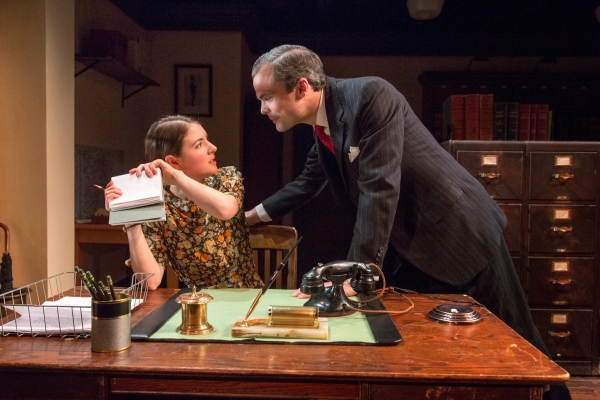London Wall

(© Richard Termine)
The invention of the typewriter in the 19th century gave women the chance to work in the stubbornly masculine domain of the business office, and along with that chance came women's dreams of self-sufficiency. Unfortunately, sexual improprieties by male coworkers and unconscionably low wages were part and parcel of that mostly false promise of financial independence.
In his 1931 play London Wall, directed by Davis McCallum and now playing at off-Broadway's Mint Theater Company, John Van Druten (his play I Am a Camera inspired the musical Cabaret, which will receive a revival this spring) took an acute and critical look at the inequalities and indignities that women put up with while trying to eke out a self-sustaining living. Van Druten's engaging storyline, sharply drawn characters, and keen, often humorous insights into office politics make London Wall relevant theater more than 80 years after its premiere, though typewriters have since been replaced by computer keyboards.
The play takes place around 1930 in the law offices of Walker, Windermere & Co. Elise Kibler plays 19-year-old Pat Milligan, the firm's new typist. Pat works with Miss Hooper (Alex Trow), who's dating a married man; Blanche Janus (Julia Coffey), a jaded veteran of office politics; and the bubbly, fun-loving blonde Miss Bufton (Kate Gibson). The dotty dowager and frequent client of the law firm, Miss Willesden (Laurie Kennedy in an endearing performance), takes a special interest in husbandless Pat when she learns how little typists make. Matthew Gumley is the smart-alecky Cockney office boy Birkenshaw, who surreptitiously listens in on coworkers' phone calls, and Stephen Plunkett plays Mr. Brewer, the firm's office manager, junior lawyer, and resident lothario. Mr. Brewer likes to put the moves on pretty young new hires, and innocent Pat is next in his sights.
Mr. Brewer makes his move quickly, unlike Pat's close friend and potential boyfriend, Hec (played by Christopher Sears with a quirky, Dick Van Dyke-esque charm). Hec likes Pat, but he's timid about letting her know how much. So when Mr. Brewer asks Pat out, she accepts. "Why shouldn't I enjoy myself?" she shouts at Blanche, who's been advising Pat to stay away from Mr. Brewer, because Blanche has been down that road before. Mr. Brewer's intentions, unsurprisingly, are not honorable.
When Pat finally decides to heed Blanche's advice and decline Mr. Brewer's invitation to accompany him to his flat, his violent reaction brings down the wrath of the firm's senior lawyer and head honcho, Mr. Walker (Jonathan Hogan, embodying the wisdom of Solomon along with an incomparable deadpan humor). Punishments are judiciously doled out, and warnings are given about this new sort of workplace where the sexes are permitted to mingle.
Performances are top-notch across the board. Kibler gives a pitch-perfect portrayal of naïve Pat, her voice chirping desperately as her innocence is shot from the air, and Plunkett embodies the caddish, self-centered office predator with equal parts charm and repugnance. The production's standout performance, however, belongs to Julia Coffey, who engenders profound pathos as she gently puts a telephone receiver in its cradle and realizes that the secret dream she had for her future has just evaporated. Hers is the performance that will stay with you for days.
The painstakingly detailed set is just as memorable. Everything about this fine production recalls the London of the 1920s and '30s, with Marion Williams' period furniture and Joshua Yocom's props, including the old cabinets and drawers that make up the stage's proscenium arch, as well as the wall-mounted buzzer and light that summons Pat and the other typists like a Skinner box.
Though it is one of Van Druten’s lesser-known works, London Wall deserves a spot in the 20th century theater canon, and the Mint has wisely returned this entertaining and important work to the stage in an inspired production.











